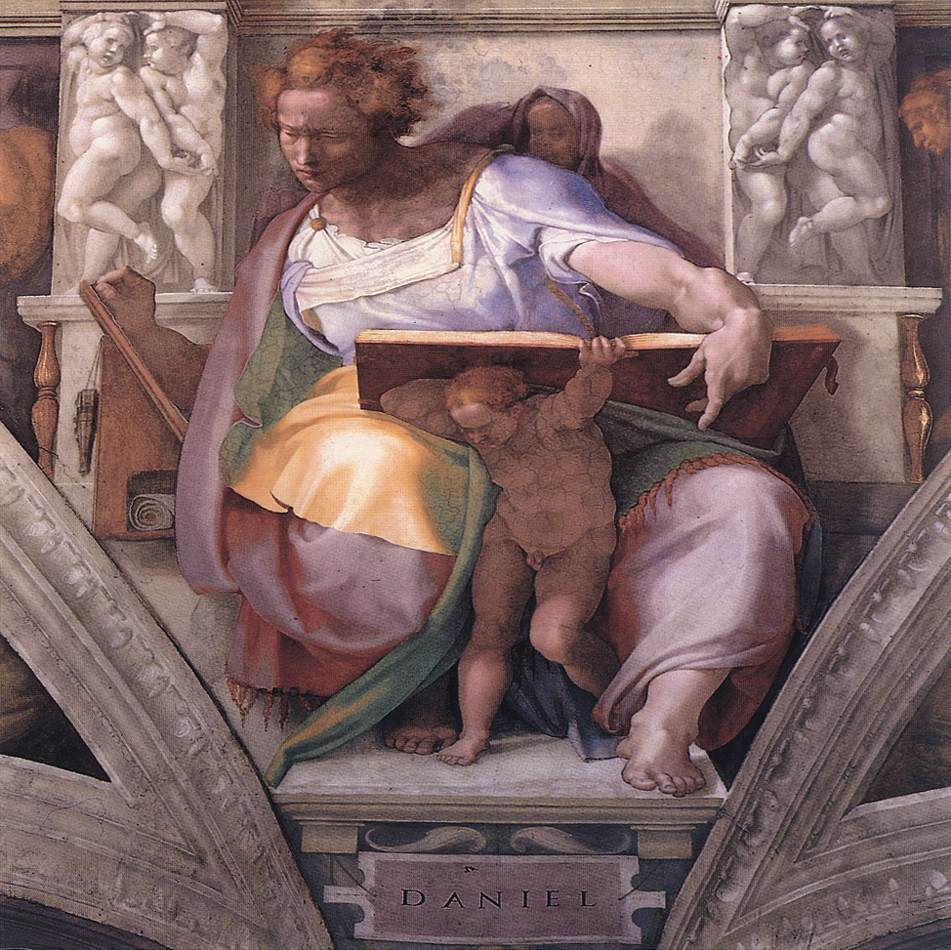 |
| Wikimedia Commons Michelangelo Sistine Chapel - Daniel |
There are several dramatic stories in Book of Daniel with which Blake was thoroughly familiar. Blake's well known figure of Nebuchadnezzar is his representation of the powerful king who was reduced to the condition of a beast until he developed awareness. Daniel's accounts of the three prophets who were consigned to the furnace being accompanied by 'the son of man' influenced Blake's poignant accounts of characters being thrown into the furnaces of affliction to be made whole. The image of the man with legs of iron, loins of brass, breast of silver and head of gold was equally influential on Blake. But in his portrait of Daniel, Blake did not refer to these incidents but to the representation of Daniel among the prophets painted by Michelangelo on the ceiling of the Sistine Chapel.
 |
| British Museum
Daniel Copy after Michelangelo's Sistine Ceiling |
Daniel 7
[25] And he shall speak great words against the most High, and shall wear out the saints of the most High, and think to change times and laws: and they shall be given into his hand until a time and times and the dividing of time.
[26] But the judgment shall sit, and they shall take away his dominion, to consume and to destroy it unto the end.
[27] And the kingdom and dominion, and the greatness of the kingdom under the whole heaven, shall be given to the people of the saints of the most High, whose kingdom is an everlasting kingdom, and all dominions shall serve and obey him.
[28] Hitherto is the end of the matter. As for me Daniel, my cogitations much troubled me, and my countenance changed in me: but I kept the matter in my heart.
Descriptive Catalogue, (E 543)
"The antiquities of every Nation Under Heaven, is no less
sacred than that of the Jews. They are the same thing as Jacob
Bryant, [P 44] and all antiquaries have proved. How other
antiquities came to be neglected and disbelieved, while those of
the Jews are collected and arranged, is an enquiry, worthy of
both the Antiquarian and the Divine. All had originally one
language, and one religion, this was the religion of Jesus, the
everlasting Gospel. Antiquity preaches the Gospel of Jesus. The
reasoning historian, turner and twister of causes and
consequences, such as Hume, Gibbon and Voltaire; cannot with all
their artifice, turn or twist one fact or disarrange self evident
action and reality. Reasons and opinions concerning acts, are not
history. Acts themselves alone are history, and these are
neither the exclusive property of Hume, Gibbon nor Voltaire,
Echard, Rapin, Plutarch, nor Herodotus. Tell me the Acts, O
historian, and leave me to reason upon them as I please; away
with your reasoning and your rubbish. All that is not action is
not [P 45] worth reading. Tell me the What; I do not want you to
tell me the Why, and the How; I can find that out myself, as well
as you can, and I will not be fooled by you into opinions, that
you please to impose, to disbelieve what you think improbable or
impossible. His opinions, who does not see spiritual agency, is
not worth any man's reading; he who rejects a fact because it is
improbable, must reject all History and retain doubts only."

No comments:
Post a Comment